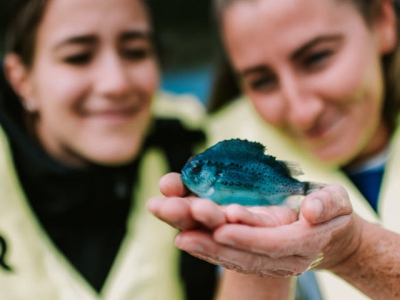BioMars latest feed diet cuts out cleaner fish cataracts

Denmark's BioMar Group reports to have found a solution to the cataract issues affecting certain varieties of cleaner fish with its latest feed recipe, named Symbio.
According to a study conducted by the firm, cataracts affect at least 60% of all lumpfish, a cleaner species commonly used in salmon pens to graze for parasitic sea lice. By damaging the fish's vision, cataracts prevent lumpfish from properly detecting lice or consuming aquafeed efficiently.
However, BioMar claims that its latest Symbio recipe will eliminate feed-related cataracts, improving the lumpfish's health, welfare and performance.
Previous studies of cataracts in lumpfish had identified nutritional imbalances with high levels of specific amino acids in certain tissues. In a recently-completed controlled feed study, for instance, BioMar found high incidences of severe cataracts in those lumpfish that were fed a control feed with a protein and fat content typical for marine cold-water species.
By reducing the content of protein and fat in a series of alternative feeds, BioMar's study resulted in no cataracts occurring among the test lumpfish.
"A balanced reduction in nutrient density was decisive in avoiding the eye disease," said Torunn Forberg, lead scientist on the study. "Moreover, during the study, the reduction in nutrients did not have any negative effect on normal growth rates, feed utilization and survival rates for transfer sized fish at 50g.”
BioMar has suggested the effectiveness of its new Lumpfish Grower range of feeds can be measured in boosts to fish health, welfare, and delousing capabilities.
Có thể bạn quan tâm
 Alternative feed component maker touts shrimp-disease fighting properties
Alternative feed component maker touts shrimp-disease fighting properties A technology that once looked promising as an alternative source of jet fuel for US military aircraft now has commercial applications for shrimp feed
 The US accept the equivalent system: great opportunity of export of Vietnamese Pangasius
The US accept the equivalent system: great opportunity of export of Vietnamese Pangasius Recently, the US Department of Agriculture has officially recognized the equivalent of food safety control system (ATTP) of Vietnamese catfish to America
 Sea lice set to survive increased ocean acidification
Sea lice set to survive increased ocean acidification The strain of sea louse most closely linked to the spread of disease and mortalities in both farmed and wild Atlantic salmon is unlikely to be adversely